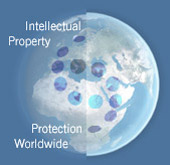| |
Patents stimulate technological development by entitling the owner to a monopoly over commercial use
of an invention for a fixed period of time.
A patent is a legal document describing and claiming the technical features of an invention.
A patent provides its owner with the legal right to prevent any other person from commercially
exploiting the invention that it claims. The right to own a particular patent must generally be
obtained and enforced on a country-by-country basis.
In many European countries there are two systems for obtaining a patent. Each country has its
national system which accepts patent applications and grants patents valid solely in the
individual country. An alternative exists in the European countries that are Contracting
States of the European Patent Convention, administered by the European Patent Office (EPO).
The EPO is the 'regional' patent office for Europe: based in Munich, it accepts and processes
patent applications and grants European patents that may then be validated and enforced in
individual Contracting States.
An International Patent Application allows a single document to be filed at a single patent
office in a single language. The International Patent Application is recognised by most of
the World’s national and regional patent offices and simplifies the initial steps in the
procedure for protecting an invention in multiple countries.
|
|


